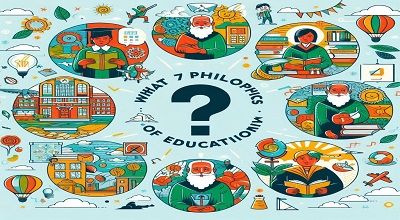7 Philosophies of education
Education is not just about transferring knowledge; it is deeply rooted in various philosophies that shape teaching methods, curriculum design, and learning outcomes. Understanding these educational philosophies helps educators develop effective teaching strategies that align with their goals.
In this blog post, we will explore seven major philosophies of education:
- Idealism
- Realism
- Perennialism
- Essentialism
- Progressivism
- Reconstructionism/Critical Theory
- Eclecticism
- Existentialism
Each philosophy offers unique perspectives on how education should be structured, delivered, and perceived. By the end of this guide, you will have a clear understanding of these philosophies and how they influence modern education.
Full Details
Idealism in Philosophy of Education
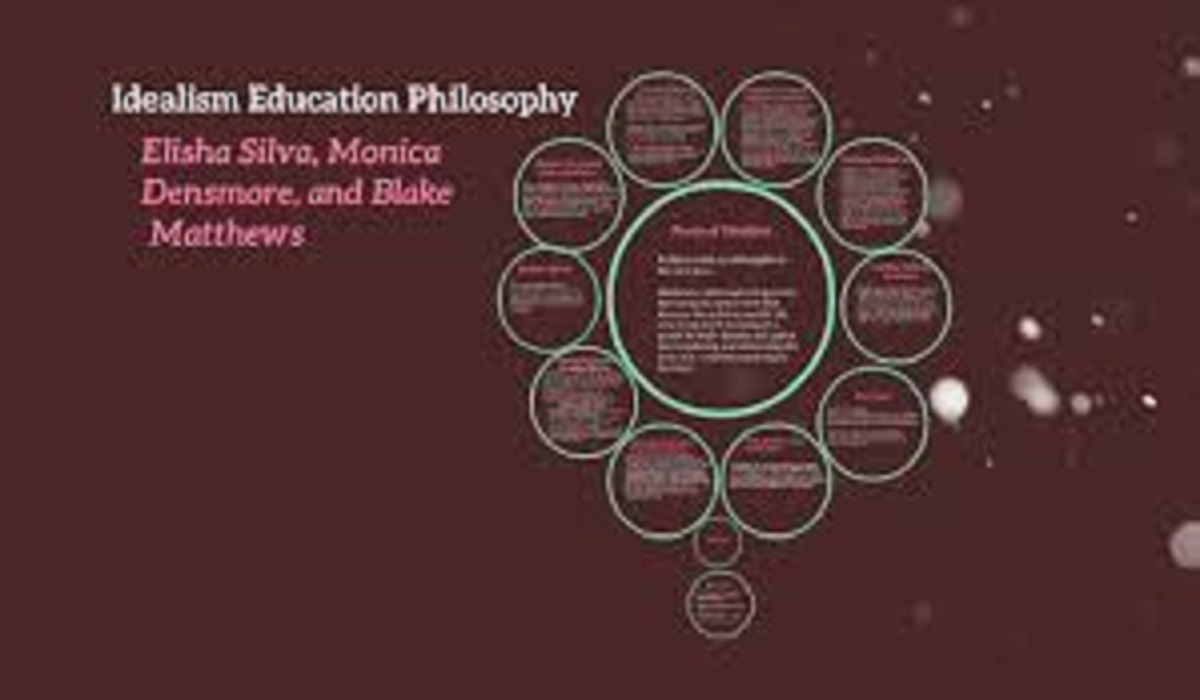
Idealism is one of the oldest and most influential philosophies in education, rooted in the belief that reality is fundamentally mental or spiritual rather than material. This philosophy emphasizes ideas, values, and the mind as the primary sources of knowledge and truth.
In this section, we will explore:
- What is Idealism?
- Key Thinkers in Idealism
- Principles of Idealism in Education
- Idealism’s Impact on Teaching Methods
- Criticisms of Idealism
What is Idealism?
Idealism posits that:
- Reality is shaped by the mind and ideas rather than physical matter.
- Truth and knowledge are eternal and unchanging (similar to Perennialism).
- The spiritual and intellectual world is more important than the material world.
This philosophy dates back to Plato, who argued that the physical world is a shadow of a higher, perfect realm of Forms or Ideas.
Key Thinkers in Idealism
- Plato (427–347 BCE)
- Introduced the Theory of Forms, suggesting that abstract concepts (justice, beauty) are more real than their physical manifestations.
- Immanuel Kant (1724–1804)
- Argued that the mind structures reality through categories of understanding.
- Georg Wilhelm Friedrich Hegel (1770–1831)
- Developed Absolute Idealism, stating that reality is a dynamic process of mind (Spirit) unfolding through history.
- Ralph Waldo Emerson (1803–1882)
- A transcendentalist who believed in intuition and spiritual truth over empirical observation.
Principles of Idealism in Education
- Education Should Cultivate the Mind
- Focus on intellectual and moral development rather than just skills.
- Teachers as Role Models
- Teachers should embody wisdom and ethical behavior, guiding students toward truth.
- Emphasis on Humanities & Liberal Arts
- Literature, philosophy, and history are prioritized over vocational training.
- Self-Realization & Character Building
- Education should help students discover higher truths and develop strong moral character.
- Universal & Eternal Knowledge
- Curriculum should include classic works (e.g., Plato, Shakespeare) that transcend time.
Idealism’s Impact on Teaching Methods
- Lecture-Based Learning – Teachers impart wisdom through structured lessons.
- Socratic Method – Encourages critical thinking through questioning.
- Great Books Program – Focus on studying timeless philosophical and literary works.
- Ethical Discussions – Debates on morality, justice, and virtue.
Example in Modern Education
- Classical education models (e.g., St. John’s College).
- Liberal arts colleges emphasizing philosophy and critical thought.
Criticisms of Idealism
- Passive Learning – Over-reliance on lectures rather than student engagement.
- Too Abstract – Neglects practical, hands-on learning.
- Elitist – Favors intellectualism over vocational skills.
- Less Focus on Science & Technology – May undervalue STEM fields.
Realism in Philosophy of Education
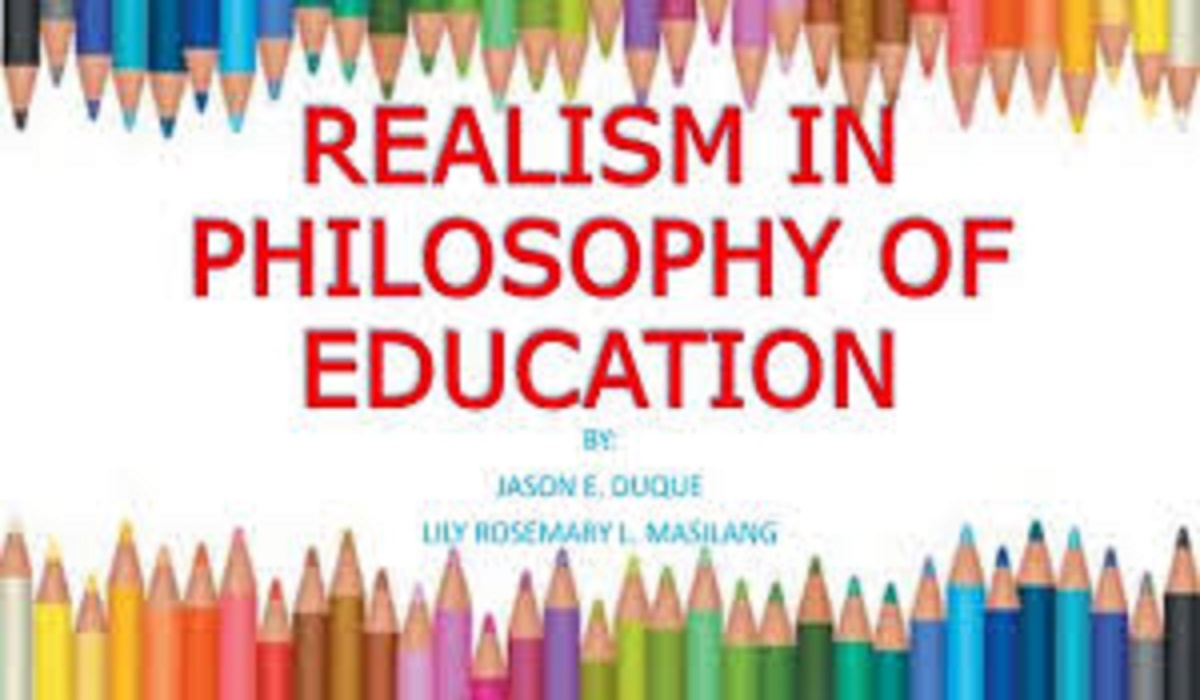
Realism is a foundational philosophy of education that asserts reality exists independently of human perception and emphasizes empirical evidence, objective truth, and practical knowledge. Unlike Idealism (which prioritizes ideas and the mind), Realism focuses on the physical and observable world as the primary source of learning.
In this section, we will explore:
- What is Realism?
- Key Thinkers in Realism
- Core Principles of Realism in Education
- Realism’s Influence on Teaching Methods
- Criticisms of Realism
What is Realism?
Realism in education is based on the following beliefs:
- The external world is real and governed by natural laws.
- Knowledge comes from observation, experience, and scientific inquiry.
- Education should prepare students to understand and function in the real world.
This philosophy aligns with scientific reasoning and is often contrasted with Idealism (which values abstract ideas) and Pragmatism (which focuses on practical problem-solving).
Key Thinkers in Realism
- Aristotle (384–322 BCE)
- Rejected Plato’s Idealism, arguing that truth is derived from the physical world.
- Emphasized logic, observation, and categorization of natural phenomena.
- John Locke (1632–1704)
- Proposed the tabula rasa (blank slate) theory, stating that knowledge comes from experience.
- Francis Bacon (1561–1626)
- Advocated for the scientific method as the best way to acquire knowledge.
- Alfred North Whitehead (1861–1947)
- Argued that education should connect theory with real-world applications.
Core Principles of Realism in Education
- Objective Reality Exists
- The world operates on fixed laws (e.g., physics, biology) that can be studied.
- Empirical Knowledge is Key
- Learning should be based on observation, experimentation, and evidence.
- Focus on Science and Mathematics
- Curriculum prioritizes STEM subjects (Science, Technology, Engineering, Math).
- Teacher as a Guide to Facts
- Educators present verified knowledge rather than subjective interpretations.
- Practical and Useful Education
- Schools should prepare students for real-world problem-solving and careers.
Realism’s Influence on Teaching Methods
- Experiential Learning – Labs, field trips, and hands-on experiments.
- Structured Curriculum – Systematic, fact-based instruction (e.g., textbooks, lectures).
- Scientific Inquiry – Encouraging hypothesis testing and data analysis.
- Vocational Training – Teaching job-ready skills (e.g., engineering, medicine).
Examples in Modern Education
- Public school science programs
- Standardized testing (e.g., PISA, TIMSS)
- Montessori’s sensory-based learning (to some extent)
Criticisms of Realism
- Assumes Neutrality – Some argue all knowledge is influenced by culture and perspective.
- Overemphasis on Facts – May neglect creativity and critical thinking.
- Less Focus on Arts & Humanities – Can undervalue subjects like philosophy and literature.
- Rigid Structure – Limits student-centered and exploratory learning.
What is Perennialism?
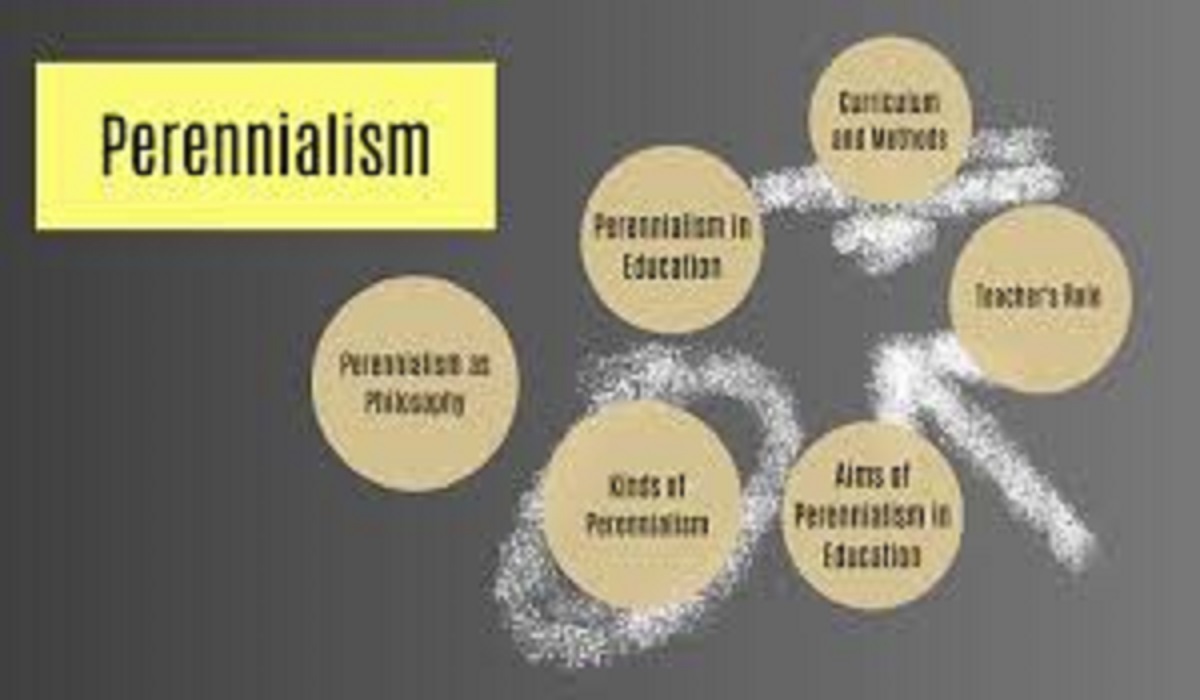
Perennialism is an educational philosophy that emphasizes eternal truths, universal knowledge, and great works of literature, history, and science. It is rooted in the belief that certain ideas and concepts are timeless and should form the foundation of education.
Key Principles of Perennialism
- Focus on classical subjects like mathematics, logic, and philosophy.
- Belief in a structured curriculum centered on enduring ideas.
- Emphasis on critical thinking and intellectual development.
- Teachers act as authoritative guides who impart wisdom.
Perennialism in Modern Education
Many classical education models, such as Great Books programs, follow Perennialist principles. Institutions like St. John’s College use this approach to cultivate deep intellectual engagement.
Criticisms of Perennialism
- May be too rigid and resistant to change.
- Overlooks practical skills and vocational training.
- Can be elitist, favoring traditional Western knowledge over diverse perspectives.
Essentialism: Back to the Basics
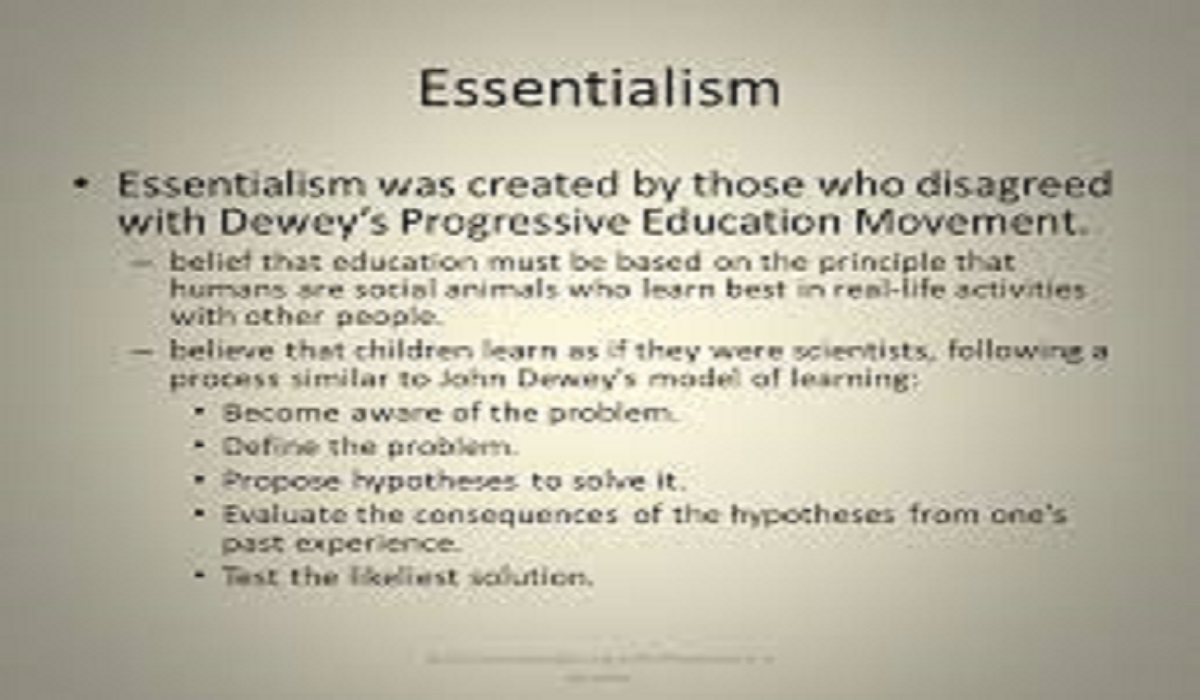
What is Essentialism?
Essentialism is an educational philosophy that focuses on core knowledge and skills necessary for productive citizenship. It prioritizes fundamental subjects like reading, writing, mathematics, and science.
Key Principles of Essentialism
- Teacher-centered approach with structured lessons.
- Emphasis on discipline, hard work, and mastery of basics.
- Curriculum is standardized and based on essential knowledge.
- Less focus on student choice; more on systematic learning.
Essentialism in Modern Education
Public schools often follow Essentialist principles by adhering to standardized testing (e.g., SAT, ACT) and Common Core standards.
Criticisms of Essentialism
- Can be too rigid, limiting creativity.
- May ignore individual learning styles.
- Focus on rote memorization rather than critical thinking.
Progressivism: Learning Through Experience
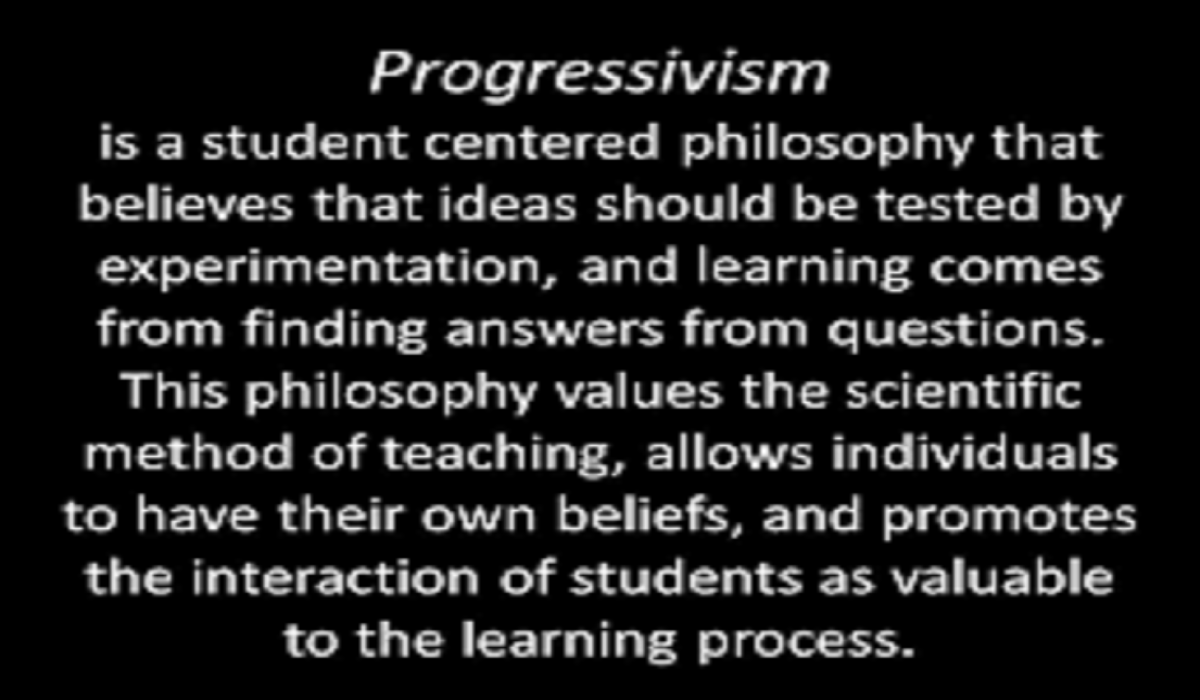
What is Progressivism?
Progressivism is a student-centered philosophy that emphasizes learning through experience, problem-solving, and real-world applications. Influenced by John Dewey, it promotes active, hands-on learning.
Key Principles of Progressivism
- Experiential learning (learning by doing).
- Emphasis on critical thinking and collaboration.
- Flexible curriculum tailored to student interests.
- Teachers act as facilitators rather than strict authorities.
Progressivism in Modern Education
- Project-based learning (PBL).
- Montessori and Waldorf schools.
- Flipped classrooms where students explore topics independently.
Criticisms of Progressivism
- May lack structured knowledge acquisition.
- Can be difficult to assess standardized learning outcomes.
- Some argue it undermines discipline and foundational knowledge.
Reconstructionism/Critical Theory: Education for Social Change
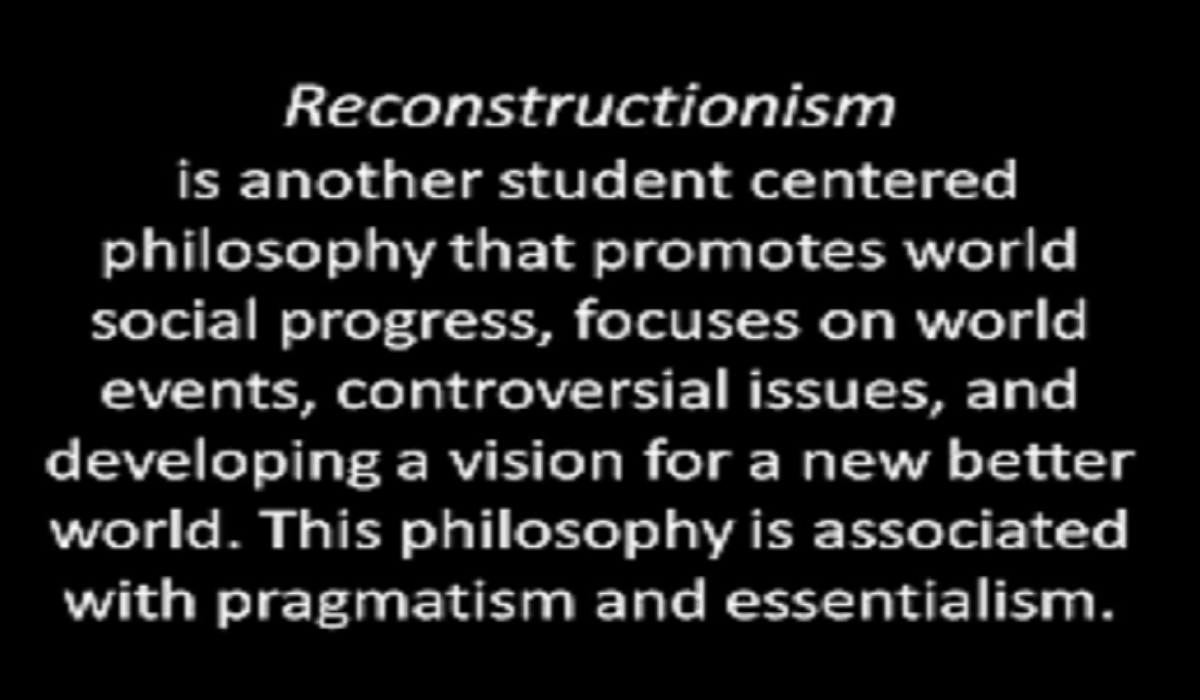
What is Reconstructionism?
Reconstructionism (or Critical Theory in Education) is a philosophy that views education as a tool for social reform and addressing inequalities. It encourages students to critically analyze societal issues and work toward justice.
Key Principles of Reconstructionism
- Education should challenge oppressive systems.
- Curriculum focuses on social justice, equity, and activism.
- Encourages student-led discussions on real-world problems.
Reconstructionism in Modern Education
- Diversity and inclusion programs.
- Service-learning projects.
- Critical pedagogy (inspired by Paulo Freire).
Criticisms of Reconstructionism
- May be seen as too political.
- Some argue it diverts focus from academic rigor.
Eclecticism: A Balanced Approach
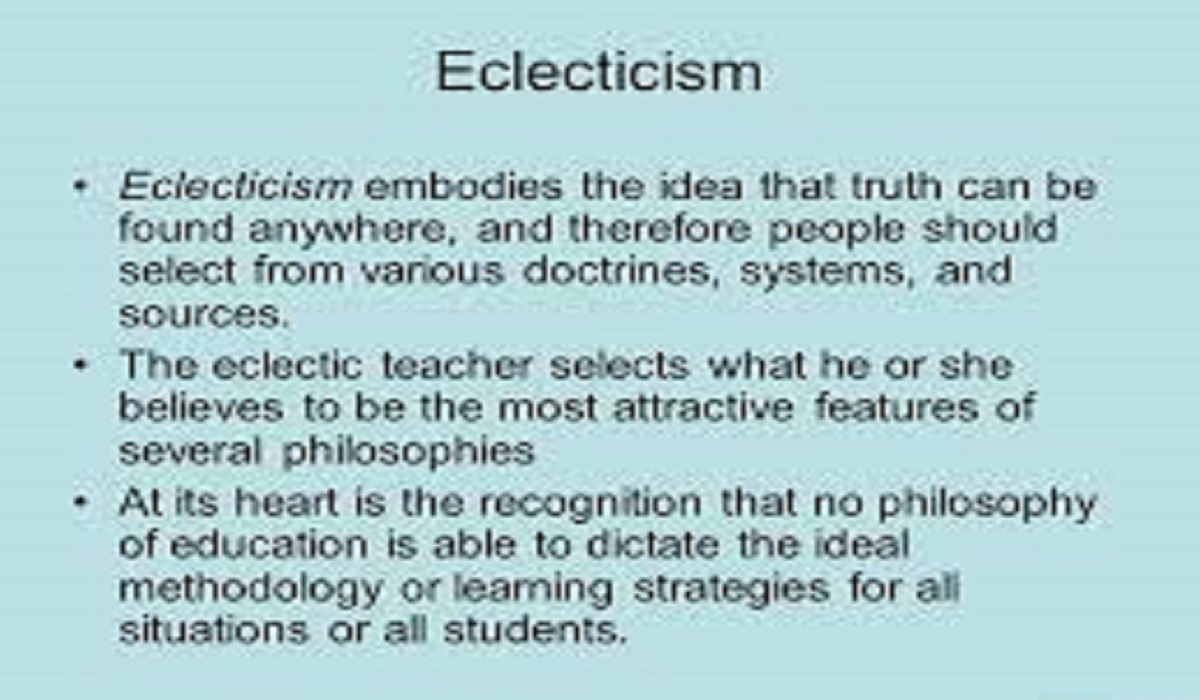
What is Eclecticism?
Eclecticism in education involves combining elements from multiple philosophies to create a flexible, adaptive teaching approach.
Key Principles of Eclecticism
- Uses multiple teaching methods based on student needs.
- Balances traditional and progressive techniques.
Examples of Eclectic Teaching
- Blended learning (online + in-person).
- Differentiated instruction.
Criticisms of Eclecticism
- Can be unstructured if not well-planned.
- Requires skilled educators to balance methods effectively.
Existentialism: Education for Individual Freedom
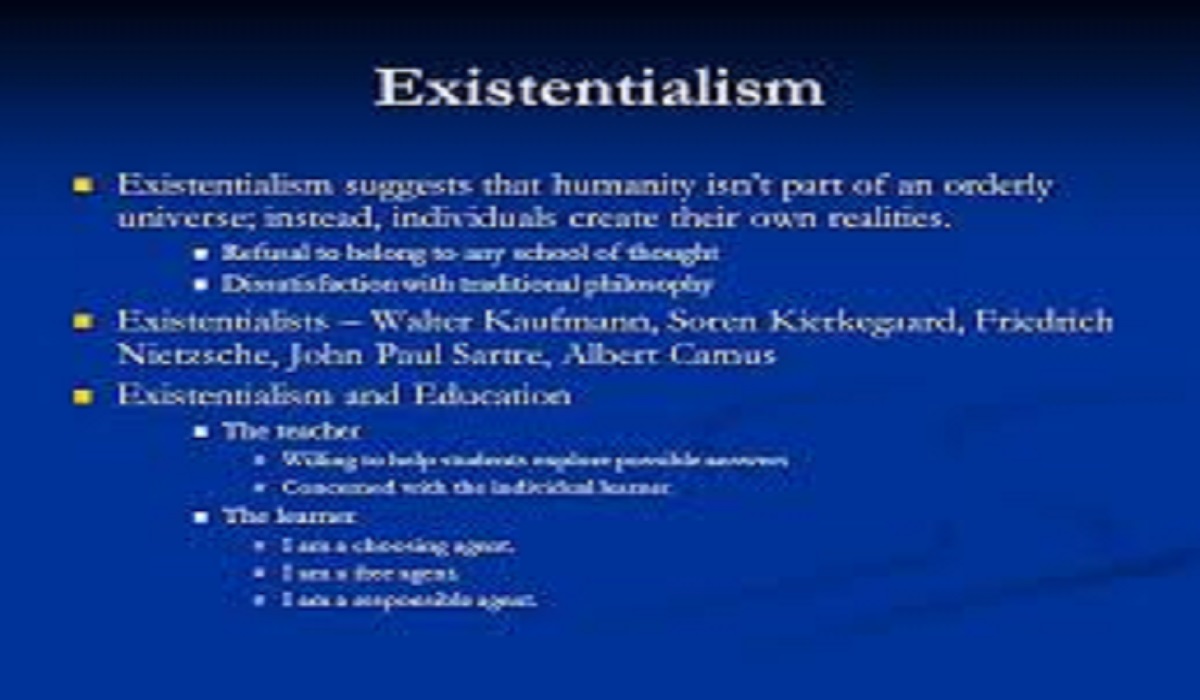
What is Existentialism?
Existentialism in education focuses on individual choice, freedom, and personal meaning. It encourages students to define their own purpose in learning.
Key Principles of Existentialism
- Student autonomy in learning.
- Emphasis on personal growth and self-discovery.
Existentialism in Modern Education
- Alternative schools (e.g., Sudbury Valley).
- Self-directed learning programs.
Criticisms of Existentialism
May lack structure and measurable outcomes.
Note:
It’s important to note that these educational philosophies are not mutually exclusive. Many educators and institutions may incorporate elements from multiple philosophies into their educational approaches. Additionally, there are other educational philosophies and paradigms beyond these seven. Educators often adapt and integrate different philosophies to meet the needs of their students and educational contexts.
Comparison Chart philosophy of education
Creating a comprehensive comparison chart of different philosophies of education can be a helpful tool for understanding their key principles and differences. Here’s a simplified comparison chart of five prominent educational philosophies: Idealism, Realism, Pragmatism, Existentialism, and Progressivism. Please note that this is a general overview, and each philosophy can have variations and nuances:
Comparison Chart
| Aspect | Idealism | Realism | Pragmatism | Existentialism | Progressivism |
| Nature of Reality | Reality is primarily | Reality exists | Reality is a matter of | Reality is subjective, | Reality is ever-changing |
| a product of the mind | independently of the | practical experience and | based on individual | and evolving, shaped by | |
| and ideas; it’s | human mind; it’s | utility; it’s grounded in | perceptions and | social interactions and | |
| ideal and perfect. | objective and concrete. | usefulness. | personal experiences. | experiences. | |
| Role of Knowledge | Knowledge is discovered | Knowledge is acquired | Knowledge is practical, | Knowledge is subjective, | Knowledge is constructed |
| through rational | through sensory | applicable, and | and individuals must | through active | |
| contemplation and | perception and | adaptable to real-life | confront the uncertainties | exploration, inquiry, and | |
| intellectual pursuits. | empirical evidence. | situations. | and anxieties of life. | problem-solving. | |
| Purpose of Education | To cultivate the intellect, | To transmit factual | To prepare students for | To help individuals find | To promote social reform |
| develop moral values, | knowledge and skills. | practical success in | meaning and personal | and democratic values. | |
| and pursue truth and | everyday life. | identity. | |||
| Teaching Methods | Emphasis on lecture, | Traditional teaching | Hands-on, experiential | Encourages questioning, | Student-centered, |
| discussion, and | methods, including | learning, problem-solving, | critical reflection, and | active learning through | |
| Socratic dialogue. | lectures and textbooks. | and critical thinking. | and exploration. | inquiry-based approaches. | |
| Role of the Teacher | Teachers are seen as | Teachers are the | Teachers serve as | Teachers guide and | Teachers facilitate, |
| authoritative guides and | primary sources of | facilitators, helping | mentors, creating a | mentor, and empower | |
| moral exemplars. | knowledge and authority. | students discover | supportive environments | students to take charge | |
| knowledge for themselves. | for self-exploration. | of their learning. | |||
| View on Curriculum | Emphasis on classical and | Emphasis on core | Curriculum should be | Emphasis on diverse, | Emphasis on a flexible, |
| foundational subjects, | academic subjects. | practical and adaptable, | relevant, and | relevant, and | |
| including philosophy | reflecting real-life | interdisciplinary | interdisciplinary | ||
| and the humanities. | skills. | subjects, including | subjects based on | ||
| the arts and sciences. | student interests. | ||||
| View on Individual | Emphasizes intellectual | Individuals are shaped | Individuals should be | Celebrates individuality, | Emphasizes individual |
| and moral development. | by their environment | prepared to adapt and | freedom, and personal | agency and creativity. | |
| Encourages conformity | and experiences. | thrive in a changing | responsibility. | Respects individual | |
| to moral and intellectual | world. | differences and | |||
| ideals. | diversity. |
Last Words
Please keep in mind that 7 philosophies of education & this chart provides a simplified overview of these philosophies, in practice, there can be variations and combinations of these educational approaches. Additionally, other philosophies and perspectives exist in the field of education. So this chart represents only a subset of the broader landscape of educational philosophy.
